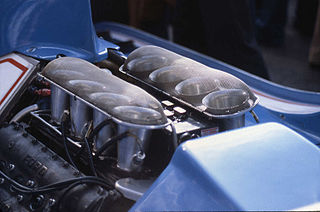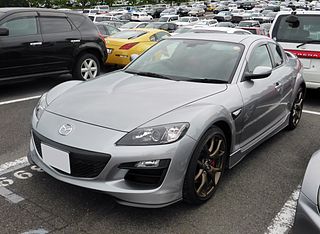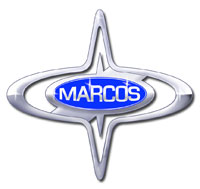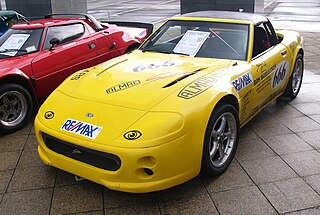Related Research Articles

A Locost is a home-built car inspired by the Lotus Seven. The car features a space frame chassis usually welded together from mild steel 1 in × 1 in square tubing. Front suspension is usually double wishbone with coil spring struts. The rear is traditionally live axle, but has many variants including independent rear suspension or De Dion tube. Body panels are usually fiberglass nose and wings and aluminium side panels. Each car is highly individualized according to the resources, needs and desires of each respective builder.

The Lotus Seven is a small, simple, lightweight, two-seater, open-top, open-wheel, sports car produced by the British manufacturer Lotus Cars between 1957 and 1972.

A kit car is an automobile available as a set of parts that a manufacturer sells and the buyer then assembles into a functioning car. Usually, many of the major mechanical systems such as the engine and transmission are sourced from donor vehicles or purchased new from other vendors. Kits vary in completeness, consisting of as little as a book of plans, or as much as a complete set with all components to assemble into a fully operational vehicle such as those from Caterham.

Cosworth is a British automotive engineering company founded in London in 1958, specialising in high-performance internal combustion engines, powertrain, and electronics; for automobile racing (motorsport) and mainstream automotive industries. Cosworth is based in Northampton, England, with American facilities in Indianapolis and Mooresville, North Carolina.

Lotus Cars Limited is a British automotive company headquartered in Norfolk, England. It manufactures sports cars and racing cars noted for their light weight and fine handling characteristics.

The Lotus Elite name has been used for two production vehicles and one concept vehicle developed and manufactured by British automobile manufacturer Lotus Cars. The first generation Elite Type 14 was produced from 1957 until 1963 and the second generation model from 1974 until 1982. The Elite name was also applied to a concept vehicle unveiled in 2010.
Caterham Cars is a British manufacturer of specialist lightweight sports cars established in Caterham, Surrey, with their headquarters in Crawley, Sussex. Their current model, the Caterham 7, originally launched in 1973, is a direct evolution of the Series 3 Lotus Seven designed by Colin Chapman. In the 1990s the company made the Caterham 21, a two-seater soft top alternative to the MGF and Lotus Elise,. A track-only car, the SP/300.R, a joint project with Lola was released for customer testing in 2010 and was scheduled for release in 2013. On 27 April 2011, Team Lotus owner Tony Fernandes announced that he had purchased Caterham. On 2 April 2021, news was leaked that Caterham Cars was acquired outright on 31 March 2021 by VT Holdings, Japanese importer for the Caterham Seven since 2009. As well as being a Caterham importer, VT also imports Lotus cars and Royal Enfield motorcycles into Japan.

The Mazda RX-8 is a sports car manufactured by Japanese automobile manufacturer Mazda between 2002 and 2012. It was first shown in 2001 at the North American International Auto Show. It is the successor to the RX-7 and, like its predecessors in the RX range, it is powered by a rotary Wankel engine. The RX-8 was available for sale in North America from the 2003 model year.

The Lotus Europa name is used on two distinct mid-engine GT cars built by British automobile manufacturer Lotus Cars. The original Europa and its variants comprise the Lotus Types 46, 47, 54, 65 and 74, and were produced between 1966 and 1975.

Marcos Engineering was a British sports car manufacturer. The name derives from the surnames of founders Jem Marsh and Frank Costin.

The Lotus Esprit is a British sports car that was built by Lotus Cars at their Hethel factory in England between 1976 and 2004. It was among the first of designer Giorgetto Giugiaro's polygonal "folded paper" designs.

The Caterham 7 is a super-lightweight sports car produced by Caterham Cars in the United Kingdom. It is based on the Lotus Seven, a lightweight sports car sold in kit and factory-built form by Lotus Cars, from 1957 to 1972.

Robin Hood Engineering Ltd was a British kit car manufacturer based in Mansfield Woodhouse, Nottinghamshire. The factory covered 30,000 square feet (2,800 m2) and was on a one and a half acre site.

Formula 5000 was an open wheel, single seater auto-racing formula that ran in different series in various regions around the world from 1968 to 1982. It was originally intended as a low-cost series aimed at open-wheel racing cars that no longer fit into any particular formula. The '5000' denomination comes from the maximum 5.0 litre engine capacity allowed in the cars, although many cars ran with smaller engines. Manufacturers included McLaren, Eagle, March, Lola, Lotus, Elfin, Matich and Chevron.
The Buckler Cars company founded by C. D. F. Buckler was based at 67 Caversham Road, Reading, Berkshire, England and produced approximately 400 cars between 1947 and 1962. In about 1947, Buckler took over the Welco Farm Implements Ltd at Crowthorne, Berkshire and a plaque can be seen on the site of the former factory.

Chevron Cars Ltd. is an English manufacturer of racing cars, founded by Derek Bennett in 1965. Following Bennett's death in 1978, the firm has remained active in various guises. The original company's designs and name continue to be used to build replacement parts and continuation models of earlier Chevrons. In 2000, Chevron Racing Cars Ltd., founded by Vin Malkie acquired the trade mark Chevron Racing Cars Ltd and in addition to the company's other activities has designed and built new grand tourer racing cars under the Chevron name, as well as other continuation models of earlier Chevrons.
The Lotus Esprit GT1 was a sports racing car produced by Lotus Engineering, a subsidiary of Lotus Cars formed to develop racing cars to compete in the GT1 class racing. It competed in the BPR Global GT Series in the mid 1990s.
Mills Extreme Vehicles (MEV) is a kit car design and manufacturing company based in Gloucestershire, England, founded in 2003.

Almac is a New Zealand-based kit car company founded in 1984 and located in Upper Hutt. Almac cars is a part of Almac Reinforced Plastics Ltd fibreglass product manufacturing a company founded in 1971 by Alex McDonald. McDonald's interest in kit cars started while he was living in England, having purchased a Jem Marsh Sirocco. Jem Marsh founded the Marcos car company.

New Zealand had a long history of small garages and vehicle enthusiasts modifying and creating sports and sports racing cars. Out of these interests grew the New Zealand kit and replica car industry with the introduction of fibre-glass car bodies in the 1950s.
References
- ↑ "CHEVRON ENGINEERING SPECIALTIES LIMITED (109068) Registered". companiesoffice.govt.nz. Archived from the original on 1 June 2021. Retrieved 1 June 2021.
- ↑ "New Zealands Lotus 7 & Clubman forums • View topic - Chevron V8". Archived from the original on 21 March 2012. Retrieved 29 August 2011.
- ↑ NZ Cars - A Cottage Industry, Patrick Harlow, 2013, Willsonscott Publishing, ISBN 1877427519
- ↑ Kit Car directory - 221, NZ Classic Car, 22 May 2010